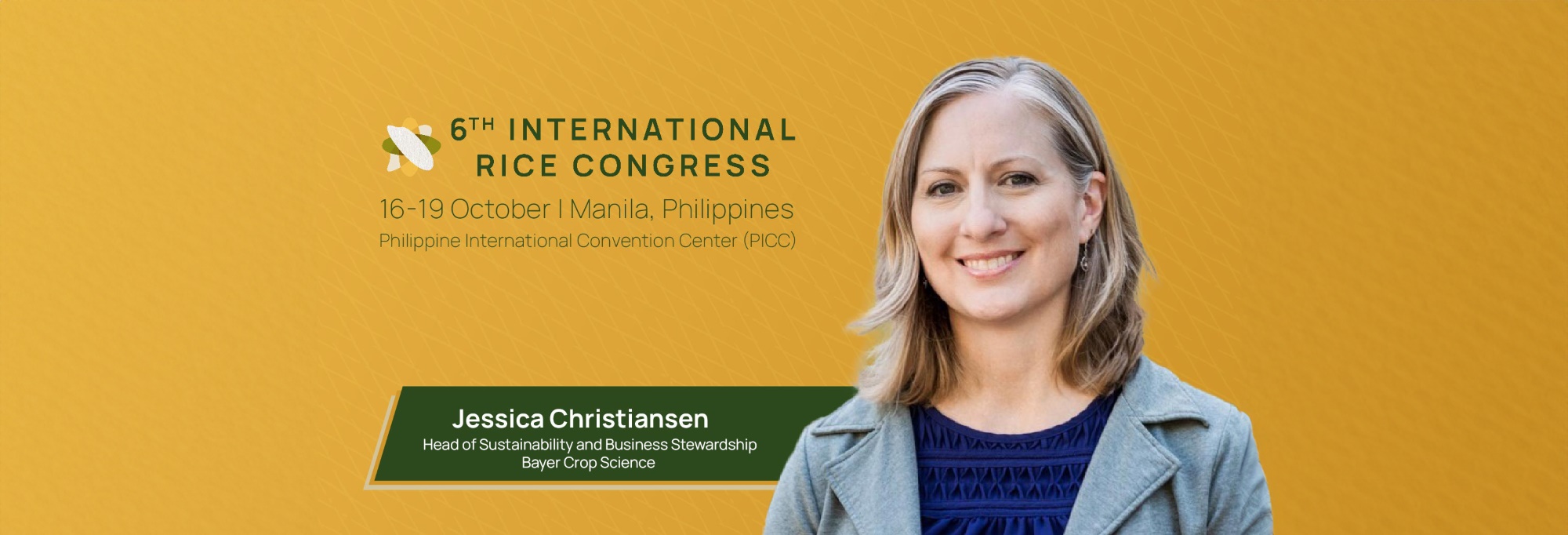Together we can sow the seeds of regenerative agriculture

By Jessica Christiansen, Head of Sustainability of Bayer Crop Science
With global population expected to grow to 10 billion by 2050, it is estimated that rice production will need to increase by 25 percent in this same timeframe to meet demand and keep prices stable. At the same time rice is both pressured by the effects of, and an important contributor to climate change. It is estimated that rice production contributes to around 12 percent of methane emissions, 1.5 percent of global GHG emissions and consumes between 34−43 percent of the world’s total irrigation water.
The world therefore faces the enormous dual challenge of having to produce more rice for a growing population and doing so in a more climate-friendly and resource-efficient way. Indeed, the need to come together to shape more economically viable and sustainable rice cultivation systems has never been so pressing.
The International Rice Congress this October therefore comes at an opportune time, and I am looking forward to joining the biggest gathering of innovators, influencers, and industry from across the world to work together on one solution that holds great promise: A crop system based on Direct Seeded Rice.
At Bayer, we are committed to building entire systems based on regenerative agriculture practices that create value for farmers and nature alike, and Direct Seeded Rice is an excellent example of this. Using the most advanced R&D capabilities we are designing climate-resilient rice hybrids with higher yields that can be sown directly in the soil. This removes the need for transplanting into paddy fields and enables the mechanization of otherwise arduous, manual farming practices. We are also developing new ways for rice farmers to protect their crop from weeds, damaging insects and disease until harvest and providing rapidly advancing digital technologies offering agronomic insights, advice and access to services.
The combination of these solutions will help smallholder rice farmers adapt to climate change, continue to run profitable businesses, and improve their own and community’s social well-being. At the same time the changes in cultivation practices will protect our planet through the reduction of greenhouse gas emissions, reduce the use of natural resources through the conservation of water, for example, and renew Earth’s natural ecosystems through the improvement of soil health. And with rice being the third most grown crop on the planet, there is huge potential to scale up the regenerative practices linked to Direct Seeded Rice on the approximately 150 million smallholder farms worldwide.
At Bayer, we’re only at the beginning of the journey towards regenerative agriculture and a sustainable future in farming. The transformation of rice production is an ambition that is vast in size, complex and requires a concerted effort and collaborative approach with the entire industry, food chain and beyond to advance adoption and make the best innovation, tools and services accessible to all.
To this end we are working alongside the International Rice Research Institute (IRRI) and have participated in the Direct Seeded Rice Consortium (DSRC) for many years. Just last year at COP27 we announced together with IRRI and the U.S. Agency for International Development (USAID) a partnership to improve the quality of life of smallholder rice farmers through the introduction, on-farm testing and scaling of improved, climate-smart rice varieties and agronomic practices. Most recently, at the 2023 UN Water Conference, we committed to reducing water use by 25 percent per kilogram of rice crop cultivated by our smallholder farmer customers by 2030 which can only be achieved by partnering with relevant stakeholders.
I am a firm believer that great things can be accomplished when experts from across different sectors unite behind a common purpose. Now at the International Rice Congress we look forward to making the connections and partnerships that will play a crucial role in bringing regenerative rice systems to farmers all over the world.
The importance of rice cannot be overstated. It is a staple for more than half the world’s population and provides more than one-fifth of the calories consumed globally. It is thus inherently linked to Bayer’s vision “Health for all. Hunger for none.” and I am convinced that together, through our combined research, resources, expertise and data, we can ensure the availability of this vitally critical food and also help restore the environment.
#bayer #forbetter #teambayer #regenerativeagriculture #dsr